
by Gideon Marcus
Back to Basics
Our family recently went to the movies to see the latest war epic, Tobruk. It's the story of a British commando unit teamed with a company of German Jews charading as a unit of the Afrika Korps. Their goal: to destroy the supply depot at Tobruk and stop Rommel in his tracks.
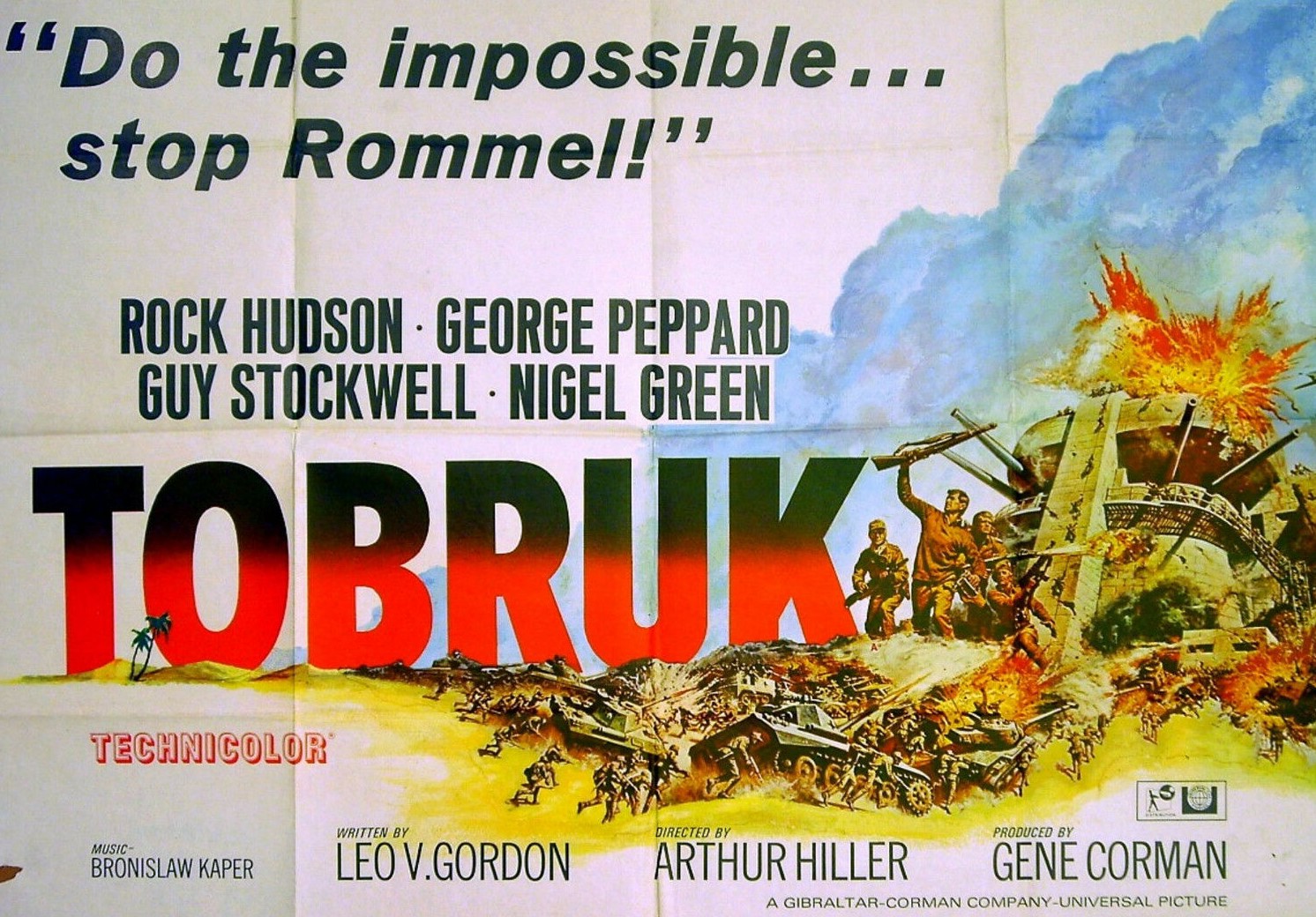
The first half was decent, but the second devolved into Hollywood schlock. Particularly when one knows one's history: there was such a raid, but it ended in abject failure. Tobruk is not so mind-numbingly mediocre as TV's Rat Patrol, but they are in the same genus.
How to get the taste out of my mouth? As it turned out, local channel 9 was airing the old Bogart movie, Sahara, filmed in 1943 as the war was going on. I'd seen it when it first premiered, and so I knew to circle the listing and bake the popcorn so my family and friends could enjoy it with me. If you haven't had the pleasure of this amazing saga of a lone M3 tank in the African desert, and its ragtag crew it collects from nearly a dozen different nations, well, give it a watch next time it airs.
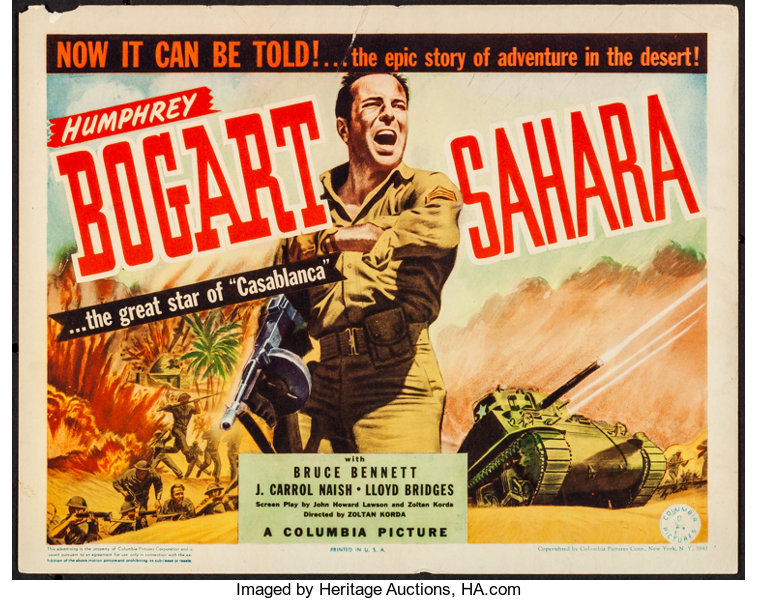
Old Standby
Just as I found the antidote to modern bloat in a classic production of the '40s, this month, the answer to the rather lackluster science fiction being turned out of late was found not in a magazine of the '40s, but in one that, for many, peaked in that "Golden Age." Indeed, the April 1967 Analog was one of the finest examples of Campbell's editorial output in a long time.
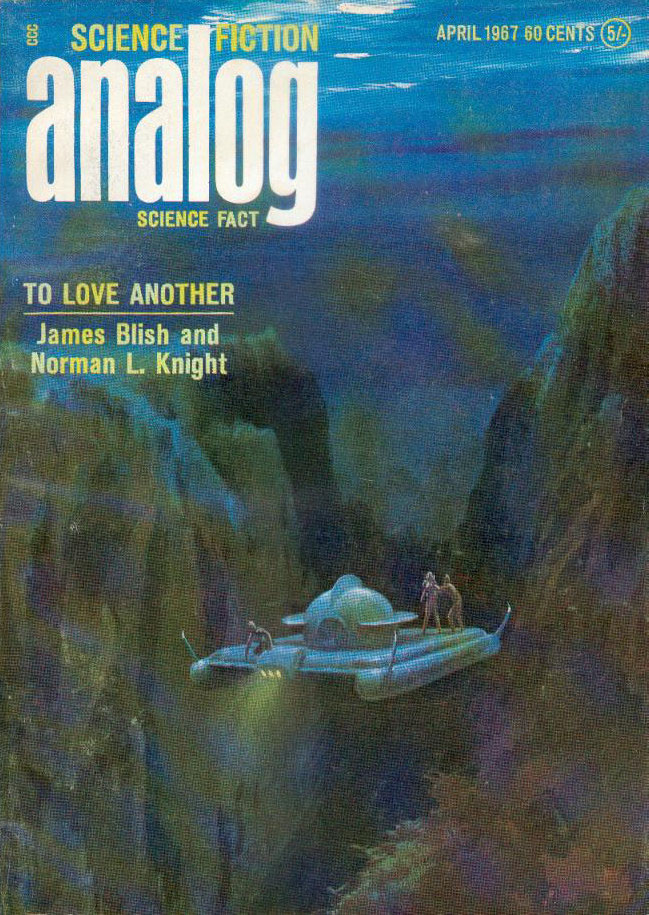
by John Schoenherr
To Love Another, by James Blish and Norman L. Knight
First, a case of eating words. Please pass the mustard.
James Blish and Norman L. Knight have composed a number of novellas in a particular setting. A few centuries from now, humanity is bursting at the seams, shoulder to shoulder on a severely overcrowded planet. The science of tectogenetics has created a new race of humans, the Tritons, one perfectly at home in the oceans. Against this backdrop, the asteroid "Flavia" is on a collision course with Earth, threatening tremendous damage when it hits. Efforts are being made to minimize its impact (pardon the pun).
Two stories have been set in this timeline: The Shipwrecked Hotel and The Piper of Dis. I rated both of them two stars. They were dull, plodding tales, and after the last one, I stated, "I hope this is the last piece in the series."
I take it back.
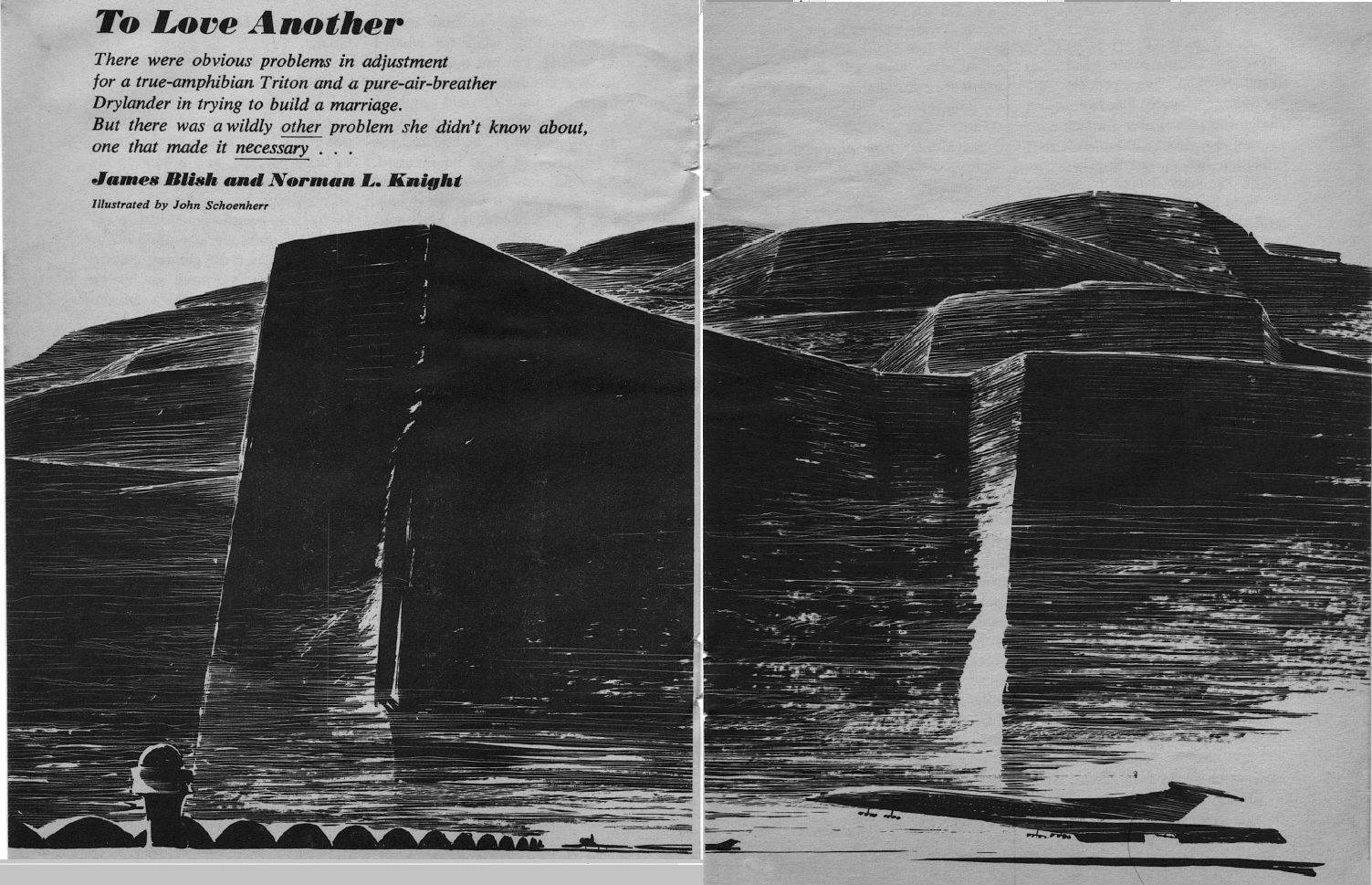
by Kelly Freas
To Love Another is a vivid tale of love between Dorthy Sumter, head of Submarine Products Corporation, and her lieutenant, the Triton Tioru. It's hard to describe it as having a plot, in the strictest sense of the word. Rather, it is a pair of viewpoints at a particular juncture in humanity's history, one of its most momentous. It is a gentle adventure that runs from the depths of the ocean, to the hive of a Habitat '67-type city, to… well, to the place In-Between.

Habitat '67 in Montreal
Not quite five stars, but excellent stuff.
The Enemy Within, by Mack Reynolds
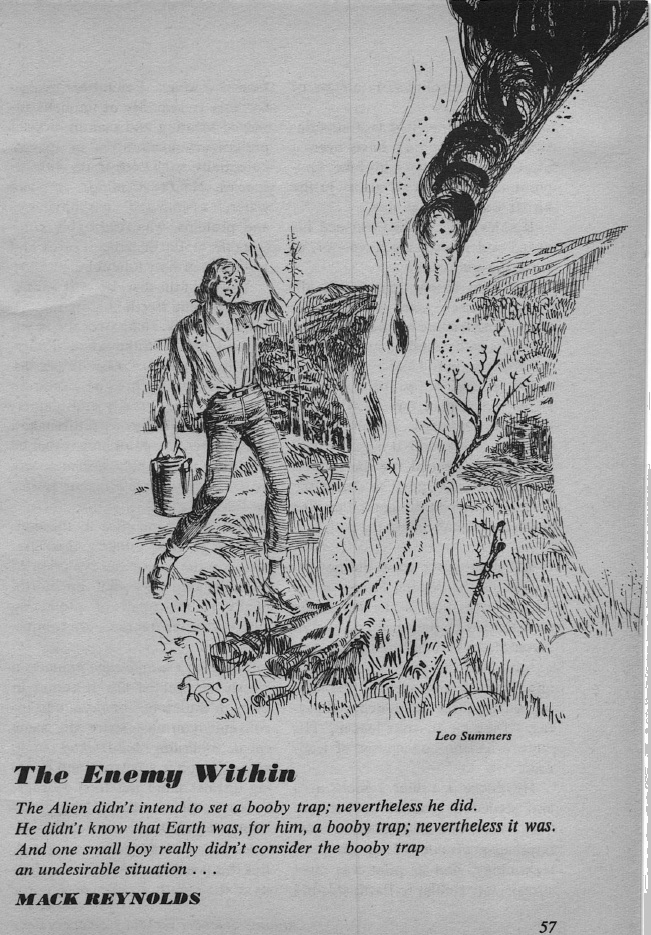
by Leo Summers
What's a mother to do when her eager little boy winds up locked inside a psuedo-intelligent spacecraft, and all her efforts seem only to make the problem worse?
This is an effective, well-drawn tale by Mr. Reynolds, though if there is anything to be taken away from it, it's that spanking is an outdated punishment that ultimately does more harm than good.
Three stars.
The Feckless Conqueror, by Carl A. Larson
If humans are to settle other planets, they will either have to adapt to new environments or adapt their enivronments. Larson examines the adaptibility of the human species, noting our tolerance to oxygen pressure, heat, cold, gravity, and magnetic fields.
It's pretty good. Three stars.
To Change Their Ways, by Joseph P. Martino
On the planet of New Eden, where the men grow wheat and the women…turn it into bread and noodles…famine threatens. Seems the hardheaded farmers refuse to give up their tailored grain, which cannot tolerate the seasonal cooling that is gradually chilling the planet (seasons last decades on this long-orbit world). A sector administrator is sent to help out the planetary coordinator, mostly to harangue him about being tougher with the recalcitrants.
If ever there was a story with no drama, no plot beats, no there, it's this one. Two stars.
The Time-Machined Saga (Part 2 of 3), by Harry Harrison
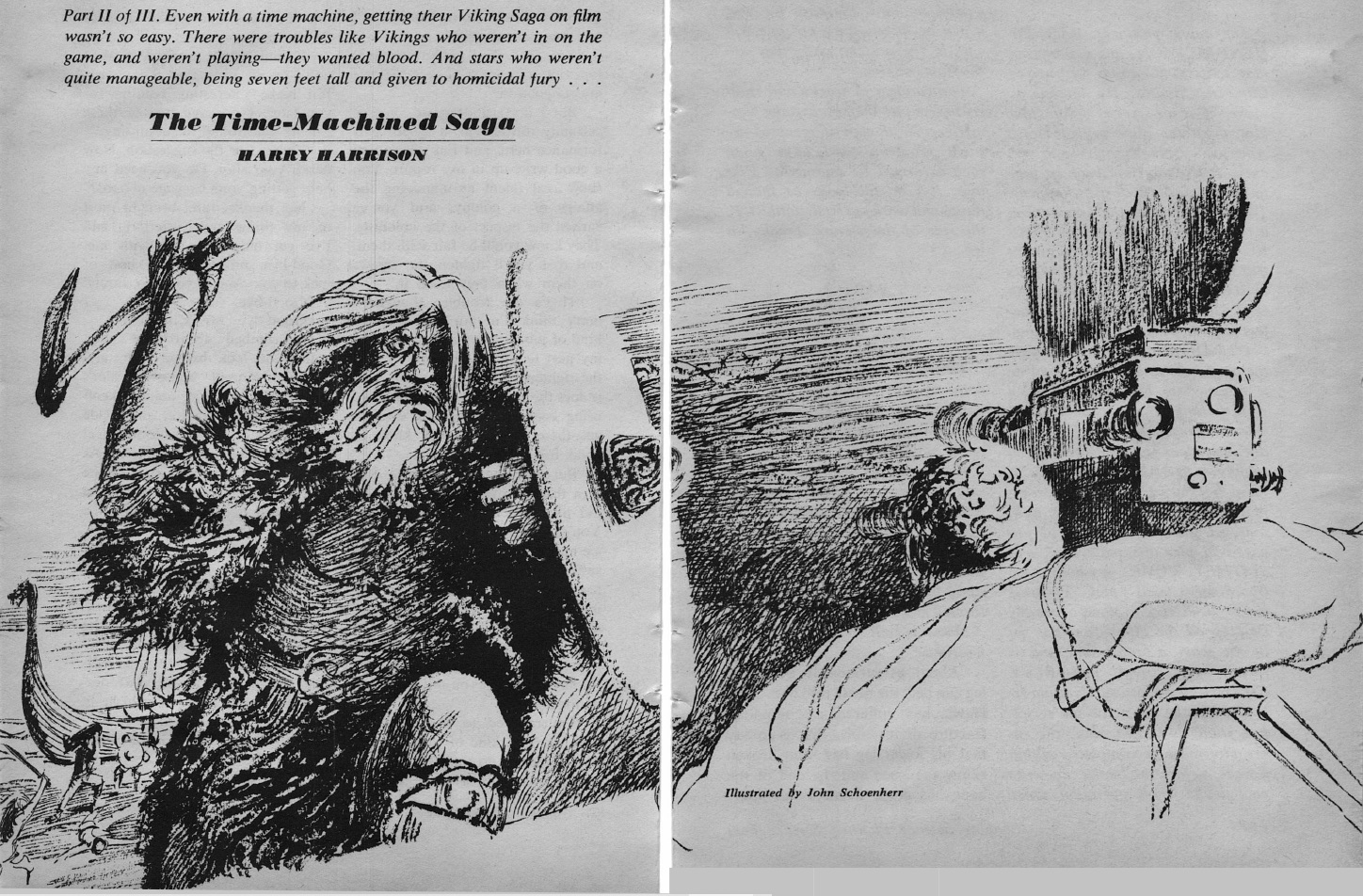
by John Schoenherr
Last month, I was a little hard on Harrison's newest serial, in which a time machine is put to work for cheap on location shooting in the 11th Century. It's better this time around, as the production of the film goes underway. The beefcake hack of a star gets a broken leg and refuses to work. Luckily, Ottar, the native Viking, is more than willing to work for a bottle of whiskey a day and a silver mark a month. And he's a natural for the part!
But while the scenes filmed in Norway and the Orkneys go well enough, a wrinkle is introduced when it is discovered that there are no colonies in Vinland–not in the 11th Century or ever. Only one solution for that: found Vinland (with cameras rolling, of course).
It's rollicking fun with a lot of good encyclopaedic data. My only quibble is that the timeline of Harrison's book is clearly all of a piece; the first installment had the film crew seeing themselves from a "later" time trip in the past. But if the timeline exists with all travels baked in, why didn't they find themselves filming the landing at Vinland? Perhaps this will be explained next chapter.
Either way, it's still worth four stars.
Ambassador to Verdammt, by Colin Kapp
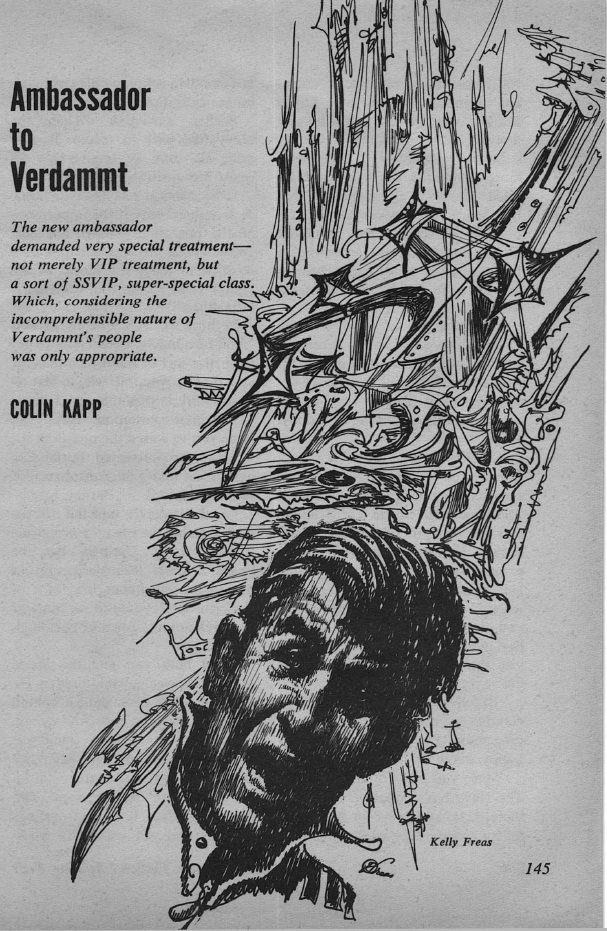
by Kelly Freas
Imagine a race of aliens so bizarre that the human mind can barely register their existence, let alone make meaningful contact. The science team on Verdammt knows the Unbekannt are intelligent beings, but prolonged interchange leads to a psychotic break. It will take a very special kind of ambassador to bridge the species gap.
This is a story that would have fared better in the hands of a true master, a Delany or a Cordwainer Smith. As it is, there's a bit too much artificial delaying of shoe-drops to heighten drama. The scenes from the perspective of the character meeting the Unbekannt lack the lyricism to really make them shine.
That said, it is a neat idea, it is at least competently rendered, and it made me think. That's what an stf story's supposed to do, right?
So, a solid three stars.
Compare and Contrast

For the second time this year, Analog has topped the pack of magazine (and magazine-ish) offerings, clocking in at 3.2 stars. Thus, it beats out New Worlds (3.1), IF (3), Path into the Unknown (2.6), Fantasy and Science Fiction (2.5), Galaxy (2.3), New Writings #10 (2.2), and Amazing (2.1).
It was a pretty peaked month, in general, with the best thing outside this issue probably a fourteen-year old reprint by Judith Merril (which was, in fact, the only piece published by a woman this entire month).
Still, it's nice to know that oases can still sometimes be found, even this often bleak desert of a modern magazine era. Here's hoping it the hot spring doesn't turn into a mirage next month…






![[May 31, 1970] A Compulsion to read (June 1970 <i>Analog</i>)](https://galacticjourney.org/wp-content/uploads/2025/05/700531analogcover-672x372.jpg)
![[July 31, 1969] Stranger than fiction (August 1969 <i>Analog</i>)](https://galacticjourney.org/wp-content/uploads/2024/07/690731analogcover-672x372.jpg)




![[March 28, 1967] At last, a drop to drink (April 1967 <i>Analog</i>)](https://galacticjourney.org/wp-content/uploads/2022/03/670328cover-649x372.jpg)











![[May 31, 1966] Worth Remembering (June 1966 <i>Analog</i>)](https://galacticjourney.org/wp-content/uploads/2021/05/660531cover-672x372.jpg)
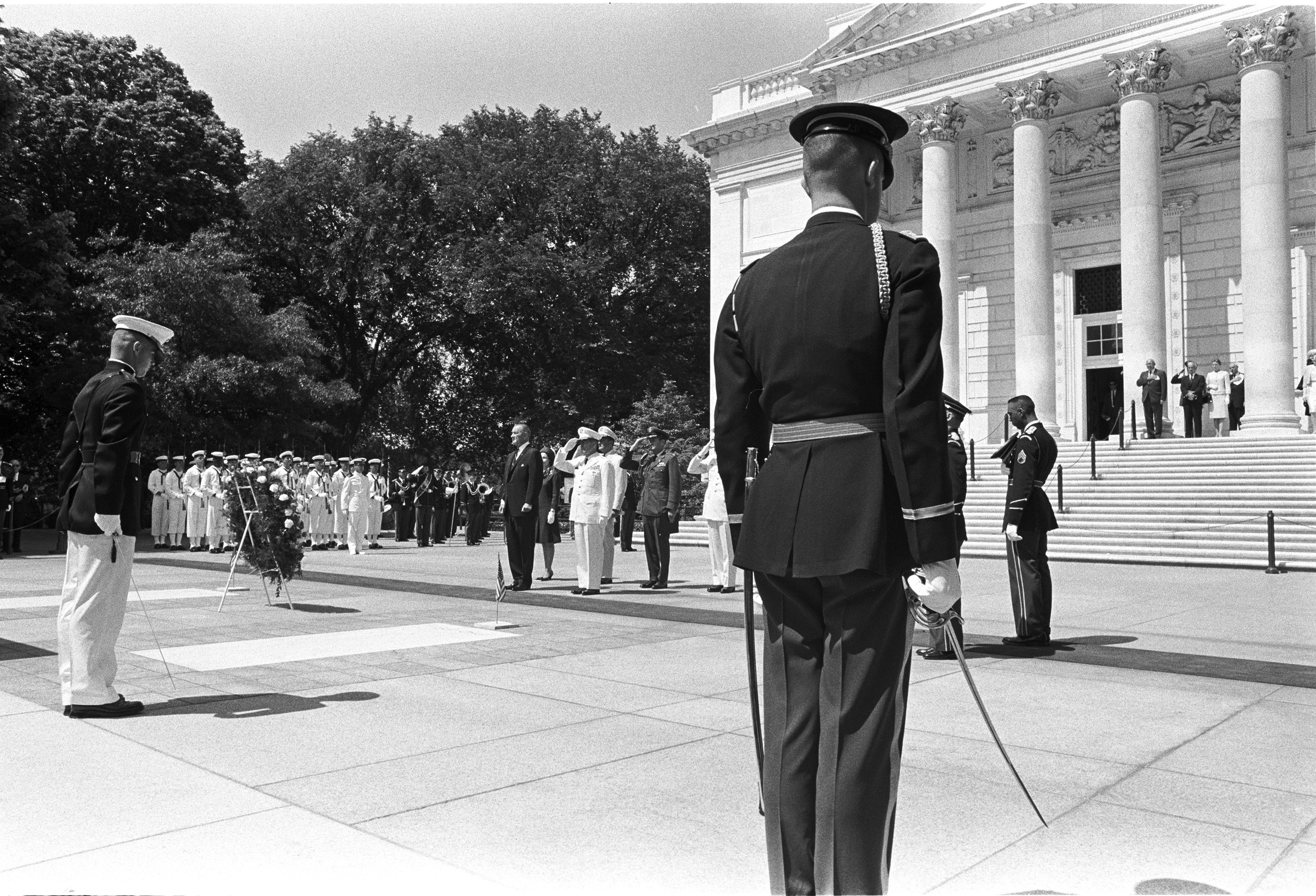
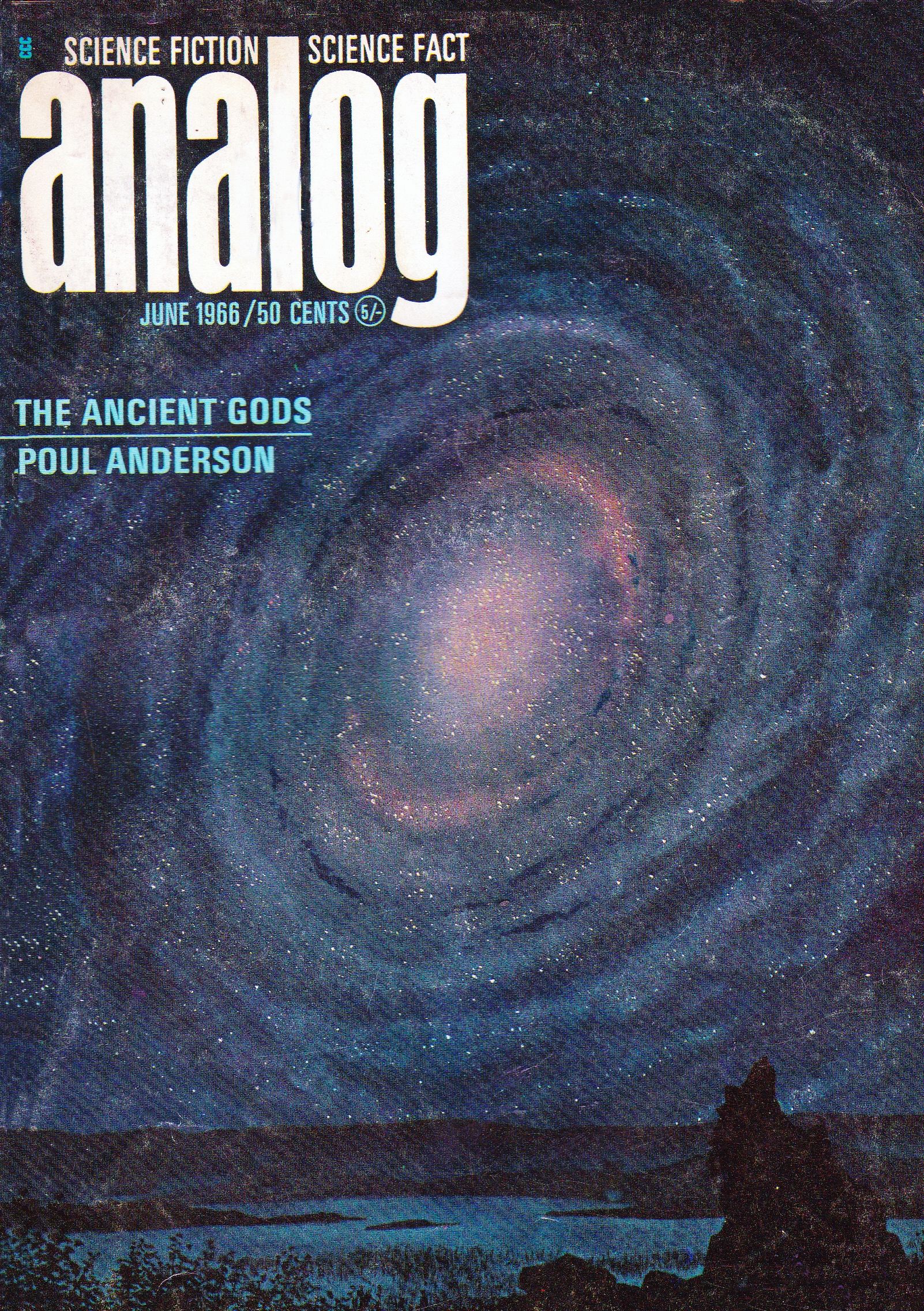
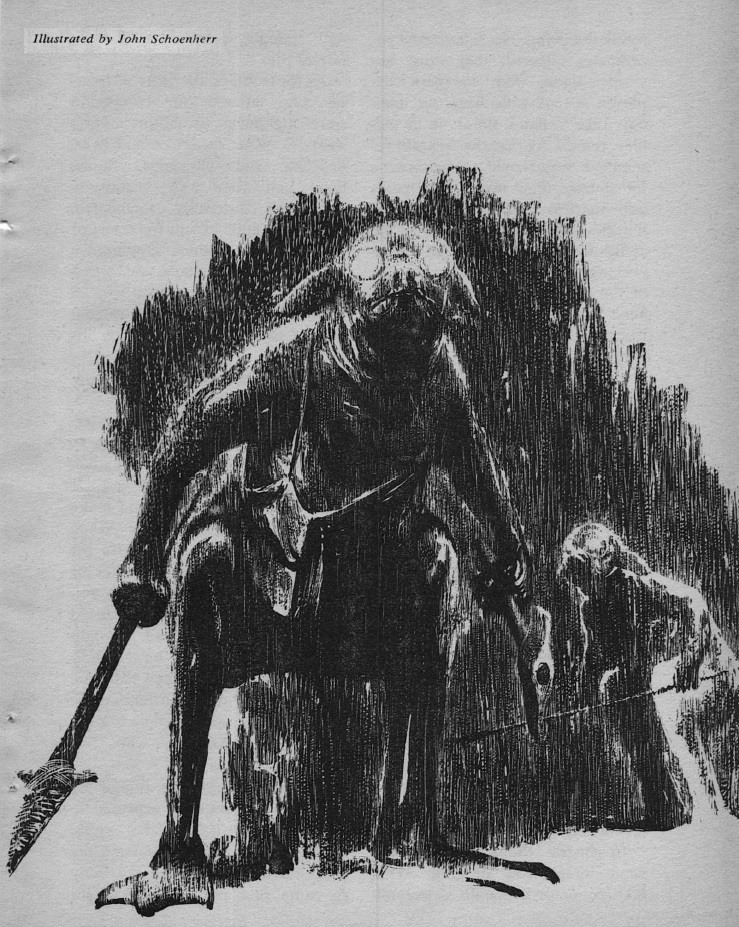
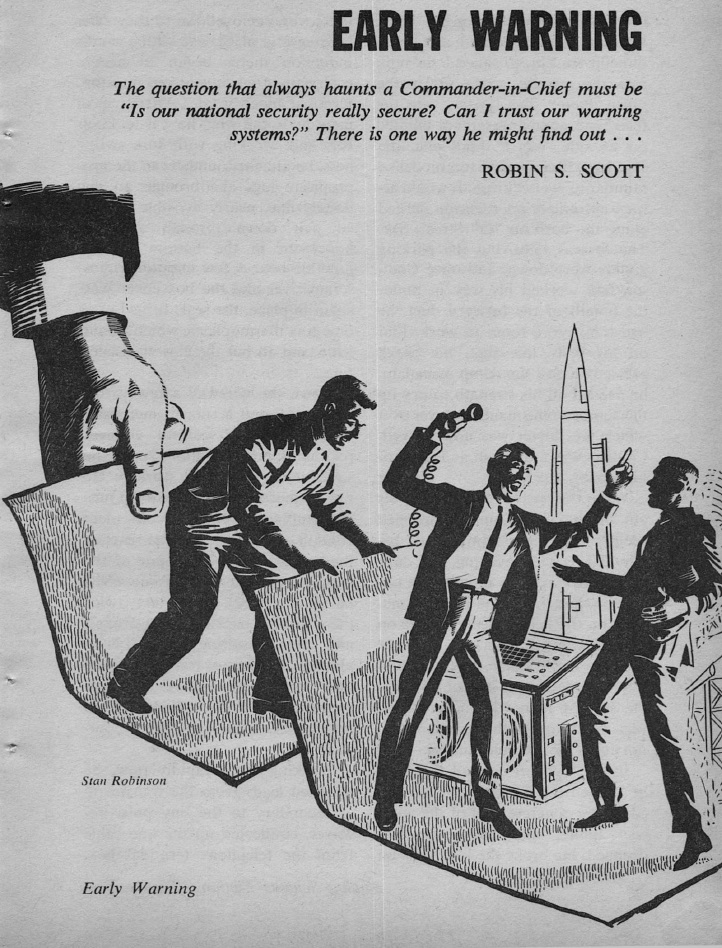
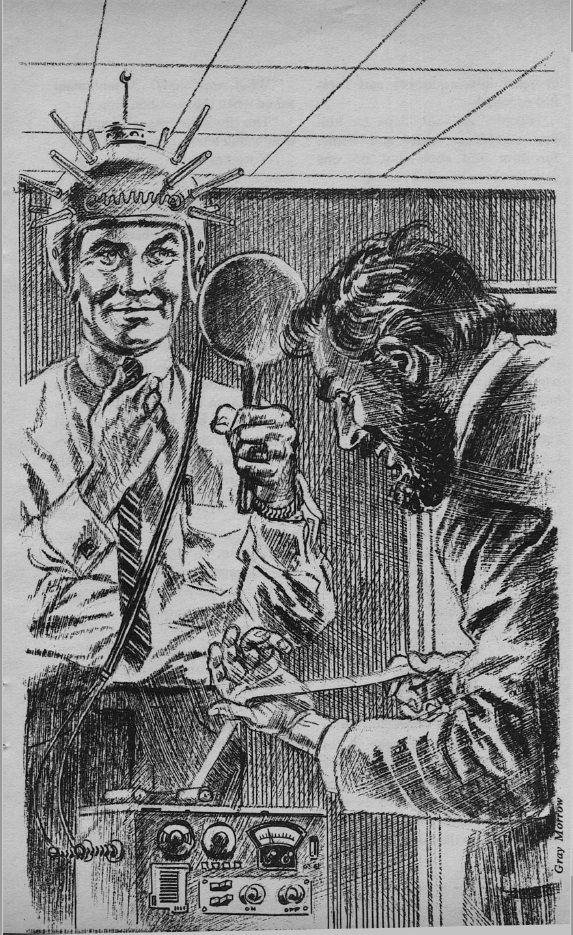
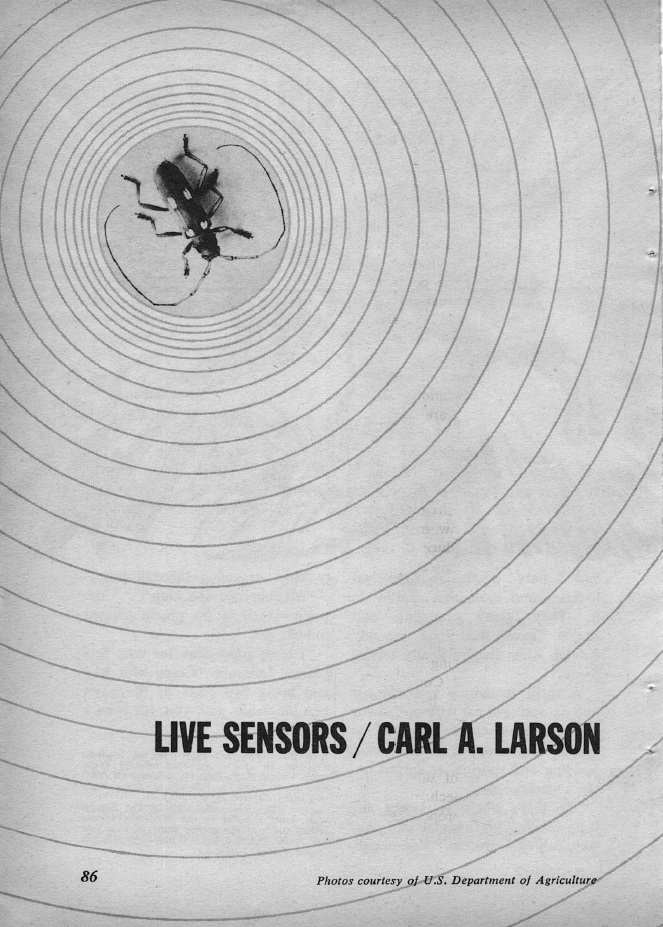




![[July 31, 1965] A spoonful of sugar (August 1965 <i>Analog</i>)](https://galacticjourney.org/wp-content/uploads/2020/07/650730cover-672x372.jpg)










